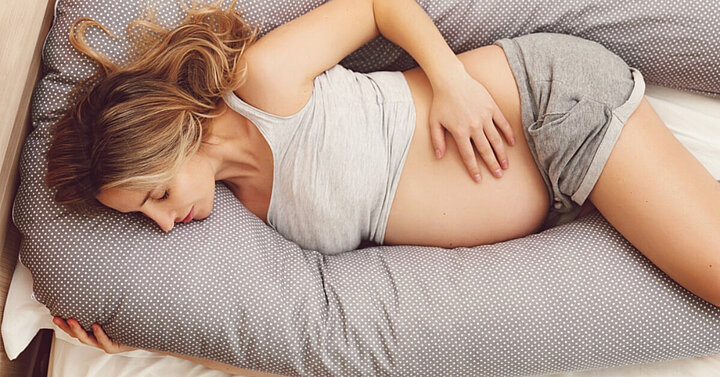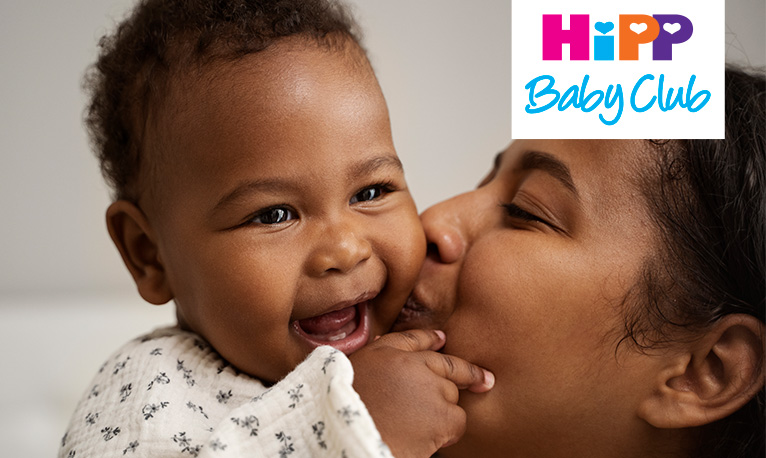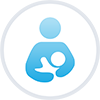Pregnancy pillows
Pregnancy | | HiPP Organic
Here’s a popular nugget of advice pregnant people get a lot: ‘Rest while you can; there’ll be no sleep once the baby’s here!’ This ‘helpful’ snippet of wisdom is the kind of thing that can set your teeth grinding. Because pregnancy is not conducive to a good night’s sleep. In fact, for some, it’s a period of extreme discomfort. And that’s where pregnancy pillows come in.
Pregnancy pillows are designed to support the changing shape of your body as your pregnancy progresses. They come in a range of shapes, sizes and materials, so you should be able to find one that suits you.
Side sleeping
NHS advice is to sleep on your side in your third trimester – either left or right – because it is safer for your baby. As your bump gets bigger, you will likely find it the most comfortable position, since that hefty weight on your tummy is squashing all your internal organs if you lie on your back. Stomach sleeping often stops being comfortable quite early on in your pregnancy.
If you’re not usually a side sleeper, it can be difficult to ‘train’ yourself to sleep in this position. Propping a pillow behind you can make it harder for you to roll onto your back in the night. If you wake up in the night to find you are lying on your back, don’t worry. Just roll over and go back to sleep on your side.
The benefits of pregnancy pillows
If you think about the shape of your body now compared to pre-pregnancy, it’s easy to see why you might be getting a lot of aches and pains. Your growing baby (plus amniotic fluid, plus placenta) is putting a lot of pressure on your back. During the day, this will impact the way you stand, walk and sit.
At night, as you lay on your side, the weight of your bump can cause discomfort in your back, hips and legs. Pregnancy pillows are designed to be comfortable and supportive, cushioning your bump and your back. They can make a world of difference to how well you sleep, and give you the energy you need to get through the next day.
Body pillows
HiPP dad Scott describes his partner’s pregnancy pillow as a ‘large, snake-like thing’. Scott is likely describing a C-shaped body pillow, designed to provide full-body support.
Body pillows also come in a U-shape design, enabling you to rest your neck, back and bump, and pop a bit of the pillow between your knees for additional support. While the C-shape design is more one-sided – giving your partner some room in the bed – the U-shape body pillows provide equal coverage on both sides, making it easier to switch from your left side to your right side and vice versa, without having to rearrange the pillow.
HiPP mum Gen recommends ‘the total U shaped one, not the half U-shaped one,’ adding: ‘It’s also really helpful to use after the baby’s born, as a breastfeeding pillow, and as a donut cushion after the birth if you are too sore to sit comfortably’.
Wedge pillows
For those who want the comfort, but are liable to toss and turn through the night, wearable sleep support might be the answer. HiPP family, Ian and Faye, recommend the Babymoov Dream Belt, which you attach around your bump for comfortable support through the night. ‘I used it in combination with a U-shaped pregnancy pillow – essential as I had pelvic girdle pain,’ says Faye.
Is it worth buying a pregnancy pillow?
Our HiPP mums report different degrees of usefulness from the pregnancy pillows, with some saying they couldn’t have managed without, while others didn’t get on with them. For this reason, it’s a good idea to ask among friends or relatives if anyone has a pregnancy pillow you could borrow – at least in the first instance. This gives you the opportunity to try before you buy.
In addition to helping you sleep through your pregnancy, it’s also worth considering how the pillow you choose could serve you after the baby comes. For example, can it double up as a breastfeeding pillow, or provide comfort for sitting/sleeping after birth?
If you do find the pregnancy pillow helpful, however, it’s certainly a worthwhile investment to see you through many months of discomfort. Getting a good night’s sleep is, after all, an important part of preparing yourself to give birth and care for a baby, not to mention to help get you through all the days before that. Some even suggest that by helping you find a comfortable position to sleep in through your third trimester, pregnancy pillows help the baby get themselves into a good position for labour.
Things to consider when buying a pregnancy pillow
Shape
As discussed, pregnancy pillows come in different shapes and sizes. Consider:
- The length of the pillow in relation to your height
- The support offered in relation to your sore spots
- The size of the pillow compared to the size of your bed (and whether or not your partner will fit in too!)
Fabric
If you find yourself getting hot and sweaty at night, it’s also important to think about what fabric your pregnancy pillow is made from. Organic cotton is more likely to help you stay cool than synthetic materials. Bamboo is a good alternative. In either case, make sure the pillow case comes off (easily!) and is machine washable, as you don’t want to harbour any nasty bacteria in your bed.
Price
Of course, the amount you are willing to pay for comfort will depend on your personal circumstances. If money is no object, or you are planning to use the pillow through more than one pregnancy, it might be worth spending more to get one that suits you best. If your budget is tight, however, you could save money by combining a few, cheaper pillows and arranging them in the way that best fits your body.
Where to buy your pregnancy pillow
We recommend taking a look at BellaMoon, who are one of our BabyClub Partners. BellaMoon is a pregnancy, breastfeeding and attachment parenting brand, specialising in pregnancy pillows, nursing and rest systems. Plus, if you join our free BabyClub you can get an exclusive discount to use on BellaMoon’s website!
When you shop online, you get to check out the online reviews – always a good idea when you’re choosing between pillow types and you haven’t had the opportunity to try one for yourself. However, you might prefer to go into a shop to give the pillows a squeeze and feel the fabric for yourself before making a decision.
Shops like John Lewis, JoJo Maman Bébé, large Boots or Asda stores and Mamas and Papas should give you a range to choose from, though if you’re making a special trip it is worth calling ahead so you’re not disappointed.
Online, you have almost too many choices – between going direct to the brand, to Amazon and everything in between. If you’re searching for a particular brand sold across many websites, use a price comparison site like Kelkoo to find the best price.
Buying second hand
As you’ll notice from online reviews, many people buy pregnancy pillows that they don’t get on with. That means that there are nearly-new pregnancy pillows available to buy second hand. Obviously, you have to be comfortable with this, and it is advisable to wash the full pillow and not just the cover should you buy a used pregnancy pillow.
However, you might find your local nearly new sale is a great way of finding the right pillow for you at a price you can afford – not to mention giving you the opportunity to stock up on other things you need for your new arrival.
Can you put a price on a good night’s sleep?
If you’ve been living on just a few hours of broken sleep, made even worse by the aches and pains that come with growing a new human, you might be thinking there is no price you wouldn’t pay to try to buy comfort. Certainly, many people find pregnancy pillows give them the support they need to get a good night’s sleep.
However, if pregnancy pillows don’t work for you and you are really suffering, don’t forget, you can also talk to your health professional about back and pelvis pain. They will be able to give you advice and recommend products or exercises to help. In particular, if the pain is stopping you from going about your normal life, seek help. You may need to be referred to a specialist physiotherapist or osteopath to help you treat and manage your pain, and ensure any additional measures that need to be taken – for example, to cope with pelvic girdle pain – are written into your birth plan.


